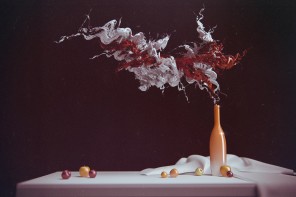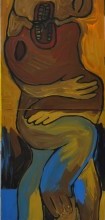Runner-up in our Hallowe’en short story contest
By Rachel Cochran
The girl’s name is Emily, and at age six, her mother dies. The first time is a week later, deep into the night, when she hears her grandfather and her father talking through the wall with deep voices that tremble like striking very low notes on the old piano. “My daughter loved you,†her grandfather says. “Very, very much.â€
“I miss her,†her father says, but he does not need to miss her anymore, because her mother is there in the room with her. She stands above Emily, wearing a long, pale nightgown like the one from the hospital. Emily wants to shout to her father, and she wants her mother to hold her, but Emily cannot move her arms and her legs. Her chest is tight and heavy as though the cat is sitting on it, and her shallow breathing makes her feel dizzy. She cannot even move her eyes to see her mother, who draws closer and stands over the bed, and who takes Emily by the throat and holds her neck tightly.
Emily cannot move her muscles to scream, so she screams without air and without noise while her father and her grandfather cry on each other’s shoulders in the other room and while her mother presses her throat into the bed. The clouds crawling across the moon splash shadows like black oil onto the ceiling.
When she is nine, Emily tells her grandfather. She has spent the night being strangled by the woman from the photograph he keeps on his desk, and when she tells him, he says that Emily is hag-ridden. The old man’s mind is going, or so her father says, and his eyes are milky white, which means he cannot tell colors apart anymore, and sometimes when he goes to pat Emily on the head he catches her shoulder instead, because she has grown so tall since last he saw her well enough to judge the distance. She asks what it means to be hag-ridden, and he tells her all about her grandmother, who died before she was born, and how the spirits would visit her when she slept and hold her, bound, and how she died of a heart attack in the night while he was in bed next to her and she never once made a noise to alert him because the spirits were holding her tongue. He touches her on the shoulder and tells her that he loves her, which makes her feel good until he calls her by her mother’s name.
When she is eleven, the phone rings in the other room one night, and not long after her father comes into her bedroom and tries to shake her awake. Even though her eyes are open he is unable to rouse her, but she already knows what he wants to tell her, because now it is her grandfather gripping her throat with hands that appear knotted and feeble but truly are quite strong. His eyes are white as marble.
When she is fourteen, she is invited to a sleepover party with the other girls from her class. They are strange around her all night, laughing with each other to jokes Emily does not understand, falling quiet when she is around. She walks through the room and hears another girl whisper the word spooky. So, Emily goes to where the sleeping bags are laid out in the basement and settles into hers, and even though it is still early she falls asleep. It happens later, flat on her back, eyes open, and she can hear the other girls snickering and rooting through her bag. When she wakes up, she finds that her bras and panties have been dipped in water and thrown into the freezer so they are stiff as drywall and cold, but she forces her body into them anyway, and she shivers in the car all the way home. Her father surely notices, but he doesn’t mention anything.
When she is eighteen, she meets Felicia, whose half of the dorm room is already tacked up with posters by the time Emily and her father move her bags in. There is even a poster on the ceiling of a pale woman’s face, but the corners are pinned too close together so that the center of the poster sort of falls, and the face on it looks like it is coming out toward Emily. Emily lies in bed, hag-ridden, nearly every night for the first week, with no spirit but that face coming down at her, and when Felicia invites her out drinking at the end of the week, Emily immediately agrees.
The bartender turns Emily away, which is no wonder since she is underdeveloped — she has been mistaken for twelve years old before — but Felicia is curvy and full and pushes her breasts together with her elbows when she leans on the bar. The bartender pours her two drinks without asking questions. Emily drinks for the first time, and one is enough to keep her laughing all the way home, leaning on Felicia, who is warm and steady. They lie together on Felicia’s bed and stare up at the poster, and Felicia tells Emily secrets — what it felt like to lose her virginity, the time she was pregnant and dropped out of school for months because she became really sick after the abortion — and asks Emily for secrets, too. Emily tells her about the hags, but Felicia only laughs and says to be serious, and then Felicia starts to tell about her abortion again, and even though Emily is fascinated her head is full and she falls asleep in Felicia’s bed. She wakes up to find Felicia shaking her, asking her to move. But Emily is hag-ridden — her mother again, still wearing the hospital gown, leans over Emily with her mouth gaping open — and cannot move, and Felicia grumbles, pulls the blankets away from Emily’s body, and turns over to sleep.
The night Emily turns nineteen she is frozen but she can see the clock reach midnight from the corner of her eye. Felicia comes back with a boy. They play loud music, and the boy looks over at where Emily is lying and asks what’s wrong with her.
“She just does that,†Felicia says.
“What, sleeps with her eyes open?â€
“Yeah,†Felicia says. She is lighting a cigarette and blowing smoke out of the window. “Pretty freaky.â€
The boy stands over Emily and waves his hand. He smells like spilled beer. “Hell-ooo,†he says. Emily cannot reply. She cannot move her eyes. “Gimme that,†says the boy.
“What for,†says Felicia.
“Just give it.†Emily can feel the cigarette pressing onto her skin, only lightly at first but then harder. Emily cannot even cry. It pulls away. “Christ,†says the boy. “She’s really out.â€
“So weird.â€
“What would happen if I touch her?â€
“Don’t do it,†Felicia says, laughing.
The boy puts his hand on Emily’s stomach. He pushes up her nightshirt and exposes her chest.
“Stop it,†Felicia says. She isn’t laughing anymore.
The boy takes his hand away. “I’ll just touch you, then,†he says.
“You’d better go.â€
“Just a little bit first,†he says. Emily hears but cannot see the struggle. All she sees is the face on the poster leering at her, and her chest feels cold. When she unfreezes in the morning, Felicia is still in bed, and she might be sleeping except that the covers are shaking. Emily does not speak to her. By the time Emily comes back from class late that night, Felicia’s half of the room is empty, the drawers all pulled out and bare.
When she is twenty-three, the nights are shorter, and she asks for a stronger pill. By now she works in an office, and when she first switches pills she oversleeps her alarm four days in a row. She apologizes to her boss on the fourth day and tries to explain, but the pinched old woman just says, “If it happens again, you’re fired.â€
It happens again. Emily moves back in with her father.
When she is twenty-four, she works overnight as a manager at a call center. The pills help her sleep through the day. Sometimes she wakes up and her lungs are sore and she knows the hags must have visited her, but she has not seen them in years now, and it has been so long since experiencing the forced stillness, the living death, that sometimes she forgets the terror of it. She barely sees her father now, though sometimes she comes home just as he is brewing coffee and gathering the paper from the porch, and sometimes he readies for bed just as she is rising. She leaves notes on the counter because he is becoming forgetful. Buy coffee creamer. Pay the electric bill. Pick up my prescription. This last one, she leaves every two weeks and wakes to find the paper replaced with a new bottle of pills until one day when her father overlooks the slip of paper and she wakes after the pharmacy has closed to find the note still untouched on the counter. She goes to work and works all night and comes home in the morning tired but unable to sleep. She lies in her childhood bed and stares at the shadows like black oil on the ceiling not thinking of anything. She can hear her father clanging at the stove in the other room, and later she hears him leave the house. She is tired, tired, and she falls asleep.
In the kitchen the note still sits on the counter, and a gust of wind blows it across the burner that Emily’s father has forgotten to switch off. It catches fire quickly and, flaming, it dances in the flurry of wind, dragging across the refrigerator front and lighting all of the business cards and sketches and photos held by magnets there. A picture of the three of them — Emily, her father, her mother — on Emily’s third birthday curls, reddens, goes black. The cabinets and carpets and walls take longer to catch, encouraged by the wind. Down the road, Emily’s father returns from a trip to the store and stops walking when sees black smoke pour from the windows.
Emily lies awake in her room, and the hags stand around her. She cannot see them clearly, but she recognizes them: the glint from grandfather’s marble eyes; the autumn-leaf odor of grandmother’s breath; the pale flutter of mother’s hospital gown; Rebecca’s mary janes planted on Emily’s chest. There are new hags, too — the boy from her graduating class whose car had gone careening off of the overpass in the ice storm last year. Felicia, fatter than when Emily saw her last, but still beautiful, still trembling. They hold her still, and she cannot cough away the smoke, and she cannot move as the fire clambers up her bedsheets, and she cannot smile as her mother’s cold hands cover her mouth and nose.
Rachel Cochran is currently pursuing her master’s degree at the University of Missouri. Her short fiction has previously appeared in Deep South Magazine, the University of Georgia’s Mandala Literary Journal, Eastern Illinois University’s The Vehicle Magazine, the University of New Haven’s New Sound Literary Journal, The Ohio River Review, and others.





